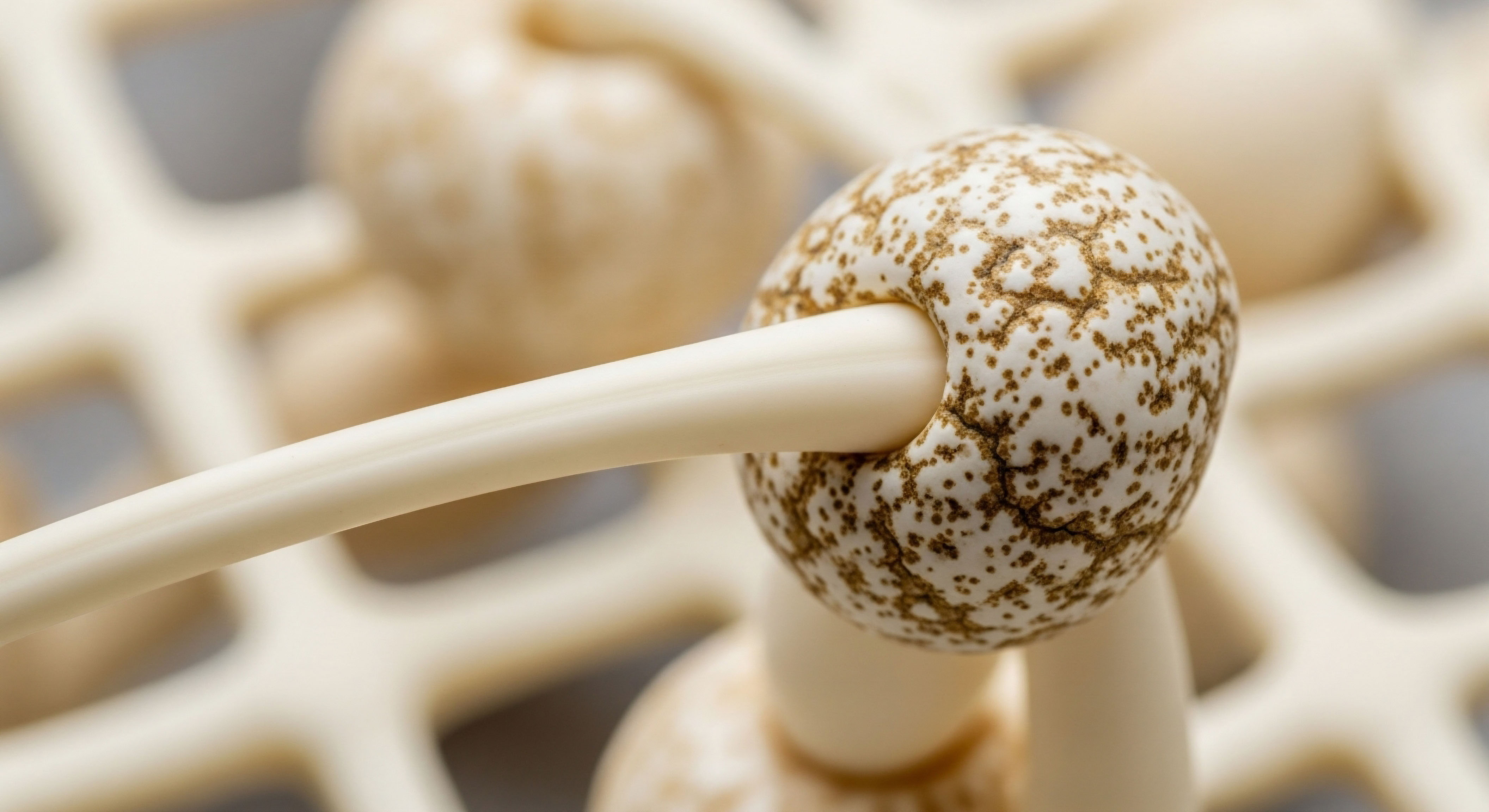

Fundamentals
Have you ever found yourself grappling with a subtle yet persistent mental fogginess, a sense that your once sharp cognitive edge has become somewhat dulled? Perhaps recalling names or details feels less automatic, or maintaining focus throughout the day requires a greater effort than it once did.
Many individuals experience these shifts, often attributing them to the natural progression of years. Yet, for some, these changes are not simply an inevitable part of aging; they can signal deeper imbalances within the body’s intricate internal messaging systems. Understanding these systems, particularly the endocrine network, holds the potential to reclaim mental acuity and overall vitality.
The male endocrine system, a sophisticated network of glands and hormones, orchestrates a vast array of bodily functions, extending far beyond reproductive health. Hormones serve as chemical messengers, traveling through the bloodstream to influence cells and tissues throughout the body, including the brain. When these messengers are in optimal balance, they support robust physiological processes. When their levels deviate from ideal ranges, even subtly, the impact can be widespread, affecting everything from physical energy and mood to, critically, cognitive function.
Optimal hormonal balance supports robust physiological processes, including mental clarity.
Among these vital chemical signals, testosterone holds a prominent position in male physiology. While widely recognized for its role in muscle mass, bone density, and libido, its influence on the central nervous system is equally significant. This steroid hormone interacts with specific receptors located throughout the brain, impacting neural pathways involved in memory, attention, and executive functions.
A decline in circulating testosterone, often associated with advancing age or certain health conditions, can therefore contribute to the very cognitive shifts many men experience.

The Brain’s Hormonal Landscape
The brain is not an isolated organ; it is profoundly responsive to the biochemical environment of the body. Within the brain, specific regions are rich in receptors for various hormones, including androgens. For instance, the hippocampus, a structure central to learning and memory formation, and the prefrontal cortex, responsible for complex decision-making and executive control, both possess a significant presence of androgen receptors. This anatomical distribution underscores the direct pathways through which male sex hormones can influence cognitive processes.
When hormonal levels are suboptimal, the brain’s ability to maintain optimal function can be compromised. This can manifest as difficulties with verbal recall, spatial reasoning, or the capacity to switch between tasks efficiently. Recognizing these symptoms as potential indicators of hormonal imbalance marks a crucial step toward addressing the root cause and exploring avenues for biochemical recalibration.

What Role Do Hormones Play in Brain Health?
Hormones act as regulators of neuronal activity and survival. They influence neurogenesis, the creation of new brain cells, and synaptic plasticity, the brain’s ability to adapt and reorganize its connections. Testosterone, for example, has been shown to exert neuroprotective effects through several mechanisms.
It can help reduce inflammation within brain tissue, a factor implicated in various neurodegenerative processes. Additionally, it possesses antioxidant properties, helping to neutralize harmful free radicals that can damage brain cells. These actions collectively contribute to maintaining a healthy neural environment, supporting long-term cognitive resilience.


Intermediate
For individuals experiencing symptoms linked to declining hormonal levels, targeted interventions can offer a path toward restoring physiological balance and, by extension, cognitive vitality. These interventions often involve precise clinical protocols designed to support the endocrine system. The aim is not simply to elevate hormone levels, but to achieve a harmonious biochemical state that promotes overall well-being, including mental sharpness.

Testosterone Replacement Therapy Protocols
Testosterone Replacement Therapy (TRT) for men experiencing symptoms of low testosterone, or hypogonadism, involves the careful administration of exogenous testosterone to restore levels to a physiological range. A common protocol involves weekly intramuscular injections of Testosterone Cypionate, typically at a concentration of 200mg/ml. This method provides a steady release of the hormone, helping to maintain consistent blood levels.
Beyond the direct administration of testosterone, comprehensive TRT protocols often include additional medications to manage the broader endocrine system. These adjuncts help mitigate potential side effects and support the body’s natural hormonal feedback loops.
- Gonadorelin ∞ Administered via subcutaneous injections, often twice weekly, this peptide stimulates the pituitary gland to produce and release luteinizing hormone (LH) and follicle-stimulating hormone (FSH). This action helps maintain natural testosterone production within the testes and supports fertility, which can be suppressed by exogenous testosterone administration.
- Anastrozole ∞ This oral tablet, typically taken twice weekly, functions as an aromatase inhibitor. Aromatase is an enzyme that converts testosterone into estrogen. By blocking this conversion, Anastrozole helps manage estrogen levels, preventing potential side effects such as gynecomastia or water retention that can arise from elevated estrogen.
- Enclomiphene ∞ In some cases, Enclomiphene may be included. This medication works by blocking estrogen receptors in the pituitary gland, which in turn signals the pituitary to produce more LH and FSH. This can further support endogenous testosterone production, particularly for men aiming to preserve testicular function or fertility.
The precise dosage and combination of these agents are always tailored to the individual’s specific laboratory values, symptom presentation, and overall health objectives. Regular monitoring of blood work, including testosterone, estrogen, and other relevant markers, is essential to ensure the protocol remains optimized and safe.
Personalized TRT protocols balance testosterone administration with adjunct medications to support endocrine harmony.

Growth Hormone Peptide Therapy
Beyond testosterone, other hormonal pathways significantly influence cognitive function. The growth hormone (GH) axis plays a vital role in cellular repair, metabolism, and neurological health. As with testosterone, GH levels naturally decline with age, contributing to symptoms such as reduced energy, altered body composition, and mental fogginess.
Growth Hormone Peptide Therapy utilizes specific peptides that stimulate the body’s own production and release of GH, rather than directly administering synthetic GH. This approach works synergistically with the body’s natural mechanisms.
Key peptides used in these protocols include:
- Sermorelin ∞ A synthetic form of growth hormone-releasing hormone (GHRH), Sermorelin prompts the pituitary gland to secrete more natural GH. It is often favored for its physiological approach to GH optimization.
- Ipamorelin / CJC-1295 ∞ This combination works to increase GH secretion. Ipamorelin is a selective GH secretagogue, while CJC-1295 extends the half-life of GHRH, leading to a more sustained release of GH.
- Tesamorelin ∞ This GHRH analog is particularly noted for its effects on reducing visceral fat, but also contributes to overall metabolic and potentially cognitive improvements.
- Hexarelin ∞ Another GH secretagogue, Hexarelin can also have cardiovascular benefits in addition to its GH-releasing properties.
- MK-677 ∞ An oral GH secretagogue, MK-677 stimulates GH release and increases insulin-like growth factor 1 (IGF-1) levels, supporting muscle growth, fat loss, and improved sleep.
These peptides can contribute to improved mental clarity, enhanced focus, and better memory by supporting neuroplasticity and overall brain health. The synergistic application of TRT and GH peptide therapy can address multiple aspects of hormonal health, potentially yielding more comprehensive improvements in cognitive function and overall vitality.

Comparing Hormonal Optimization Protocols
The selection of specific protocols depends on individual needs, symptom presentation, and laboratory findings. A clinical assessment guides the most appropriate course of action.
| Protocol Type | Primary Mechanism | Key Cognitive Benefits | Targeted Symptoms |
|---|---|---|---|
| Testosterone Replacement Therapy (TRT) | Restores circulating testosterone levels; modulates androgen receptor activity. | Improved verbal memory, spatial memory, executive function, mood stability. | Brain fog, reduced mental drive, mood changes, low libido, fatigue. |
| Growth Hormone Peptide Therapy | Stimulates natural growth hormone release; supports cellular repair and neuroplasticity. | Enhanced mental clarity, focus, concentration, memory, sleep quality. | Cognitive fogginess, low energy, poor sleep, slow recovery. |
These protocols are not isolated treatments; they are components of a holistic approach to wellness. Nutritional support, regular physical activity, stress management, and adequate sleep remain foundational elements that synergize with hormonal optimization to support long-term cognitive health.


Academic
A deeper understanding of the long-term cognitive benefits of male hormone optimization requires an exploration of the intricate biological mechanisms at play, extending into the realms of neuroendocrinology and systems biology. The brain’s capacity for sustained cognitive function is inextricably linked to the precise regulation of its internal environment, a task heavily influenced by the endocrine system.

Neurobiological Mechanisms of Androgen Action
Testosterone, along with its metabolites dihydrotestosterone (DHT) and estradiol (converted via the aromatase enzyme), exerts its influence on brain function through diverse pathways. These actions are mediated primarily by androgen receptors (ARs) and, in the case of estradiol, estrogen receptors (ERs), which are widely distributed across critical brain regions.
The binding of testosterone or DHT to ARs initiates a cascade of genomic and non-genomic effects. Genomic actions involve the translocation of the hormone-receptor complex to the cell nucleus, where it modulates gene expression. This can lead to the synthesis of proteins vital for neuronal survival, synaptic plasticity, and neurotransmitter synthesis.
For instance, testosterone has been shown to influence the production of brain-derived neurotrophic factor (BDNF), a protein crucial for neuronal growth and survival, particularly in the hippocampus.
Non-genomic actions, on the other hand, occur more rapidly and involve interactions with membrane-bound receptors or signaling pathways independent of gene transcription. These rapid effects can modulate ion channel activity, neurotransmitter release, and cellular excitability, contributing to immediate changes in neural function. The dual nature of androgen action, encompassing both slower, long-lasting genomic effects and rapid non-genomic modulation, underscores its comprehensive impact on cognitive processes.
Androgens influence brain function through both genomic and non-genomic pathways, impacting neuronal survival and plasticity.

Androgens and Neuroprotection
One of the most compelling aspects of male hormone optimization for cognitive health is its neuroprotective potential. Testosterone exhibits significant anti-inflammatory properties within the central nervous system. It can reduce the production of pro-inflammatory cytokines and chemokines, which are implicated in neurodegenerative processes and cognitive decline.
For example, studies indicate that testosterone can inhibit the secretion of the pro-inflammatory chemokine CXCL1 from astrocytes, key glial cells involved in regulating CNS inflammation. This modulation of neuroinflammation is a critical mechanism by which optimal androgen levels may safeguard cognitive function over time.
Beyond inflammation, testosterone also acts as an antioxidant, neutralizing reactive oxygen species that can cause oxidative stress and damage to neuronal cells. Oxidative stress is a recognized contributor to neurodegeneration. By mitigating this cellular damage, testosterone helps preserve neuronal integrity and function.
Furthermore, research suggests that testosterone can reduce the accumulation of amyloid-beta (Aβ) plaques and attenuate tau hyperphosphorylation, two pathological hallmarks associated with Alzheimer’s disease. These actions point to a direct role for optimal androgen status in potentially slowing the progression of age-related cognitive decline.

The Hypothalamic-Pituitary-Gonadal Axis and Cognition
The Hypothalamic-Pituitary-Gonadal (HPG) axis represents a central regulatory system for male hormonal health. The hypothalamus releases gonadotropin-releasing hormone (GnRH), which signals the pituitary gland to release LH and FSH. These gonadotropins then stimulate the testes to produce testosterone. This intricate feedback loop ensures hormonal homeostasis. Disruptions in this axis, whether due to aging, stress, or other factors, can lead to suboptimal testosterone levels, with downstream effects on cognitive function.
For instance, androgen deprivation therapy (ADT), often used in prostate cancer management, leads to significant reductions in testosterone and has been linked to an increased risk of cognitive impairment and depression. This clinical observation provides compelling evidence for the importance of maintaining adequate androgen levels for brain health. The interplay between the HPG axis and other neuroendocrine systems, such as the hypothalamic-pituitary-adrenal (HPA) axis involved in stress response, further highlights the interconnectedness of systemic health and cognitive outcomes.

Growth Hormone Axis and Neurocognitive Function
The growth hormone axis, regulated by growth hormone-releasing hormone (GHRH) from the hypothalamus and somatostatin, influences the pituitary’s release of GH. GH, in turn, stimulates the production of insulin-like growth factor 1 (IGF-1), primarily from the liver, but also locally within the brain. Both GH and IGF-1 have direct effects on brain health.
IGF-1 plays a critical role in neurogenesis, neuronal survival, and synaptic plasticity. It can cross the blood-brain barrier and influence various aspects of cognitive function, including memory and learning. Optimal levels of GH and IGF-1 are associated with improved mental clarity, focus, and overall cognitive performance. The use of GH-releasing peptides, by stimulating the body’s natural GH production, aims to restore this axis to a more youthful and functional state, thereby supporting long-term brain health.
| Mechanism | Impact on Cognitive Function | Relevant Hormones/Peptides |
|---|---|---|
| Neuroinflammation Modulation | Reduces brain inflammation, protecting neurons from damage and supporting neural circuit integrity. | Testosterone, Pentadeca Arginate (PDA) |
| Antioxidant Activity | Neutralizes free radicals, preventing oxidative stress and cellular damage in the brain. | Testosterone |
| Synaptic Plasticity & Neurogenesis | Enhances the brain’s ability to form new connections and generate new neurons, supporting learning and memory. | Testosterone, GH Peptides (Sermorelin, Ipamorelin) |
| Neurotransmitter Modulation | Influences levels and activity of neurotransmitters like dopamine and serotonin, affecting mood, motivation, and attention. | Testosterone |
| Amyloid-Beta & Tau Pathology Reduction | May reduce the accumulation of pathological proteins associated with neurodegenerative conditions. | Testosterone |
The consideration of male hormone optimization for cognitive benefits extends beyond simple symptom management. It represents a sophisticated intervention aimed at recalibrating fundamental biological systems that underpin long-term brain health and function. This systems-biology perspective recognizes that the brain’s cognitive output is a reflection of its overall metabolic and hormonal environment.

References
- Cherrier, Michael M. et al. “Effect of testosterone replacement therapy on cognitive performance and depression in men with testosterone deficiency syndrome.” Journal of Clinical Endocrinology & Metabolism, vol. 92, no. 7, 2007, pp. 2605-2610.
- Gleason, Christine E. et al. “Testosterone Treatment and Cognitive Function in Older Men With Low Testosterone and Age-Associated Memory Impairment.” JAMA, vol. 317, no. 7, 2017, pp. 717-727.
- McFadden, K. L. et al. “Testosterone and Adult Neurogenesis.” Brain Research, vol. 1655, 2017, pp. 188-197.
- Mazurek, J. M. et al. “Testosterone’s Role in Neuroprotection.” Journal of Neuroendocrinology, vol. 31, no. 6, 2019, e12730.
- Mohammad, R. M. et al. “Sexual Steroids and their Receptors Affect Microglia-Mediated Neuroinflammation in Neurodegenerative Diseases.” Frontiers in Molecular Neuroscience, vol. 14, 2021, p. 665321.
- Resnick, Susan M. et al. “Age-Related Male Hypogonadism and Cognitive Impairment in the Elderly ∞ Focus on the Effects of Testosterone Replacement Therapy on Cognition.” International Journal of Molecular Sciences, vol. 22, no. 16, 2021, p. 8779.
- Soma, Kiran K. et al. “New study by the Soma Lab looks at the effects of aging on testosterone and androgen receptors in the brain.” Hormones and Behavior, vol. 120, 2020, p. 104692.
- Tsung, Irene, et al. “Mental Health and Cognitive Toxicities of Androgen Receptor Signaling Inhibitors.” Journal of Clinical Oncology, vol. 42, no. 12, 2024, pp. 1391-1399.

Reflection
The journey toward understanding your own biological systems is a deeply personal one, a path that invites curiosity and proactive engagement. The insights gained into hormonal health and its profound connection to cognitive function serve as a starting point, not a destination. Recognizing the subtle cues your body provides, whether it is a persistent mental fogginess or a diminished capacity for focus, is the first step in a process of self-discovery and recalibration.
This knowledge empowers you to consider how biochemical balance might influence your daily experience and long-term vitality. The science of hormonal optimization offers avenues for supporting the body’s innate intelligence, guiding it back toward a state of robust function. Each individual’s physiology is unique, necessitating a personalized approach to wellness. This understanding allows for informed conversations with clinical professionals, shaping a protocol that aligns with your specific needs and aspirations for sustained cognitive health and overall well-being.



